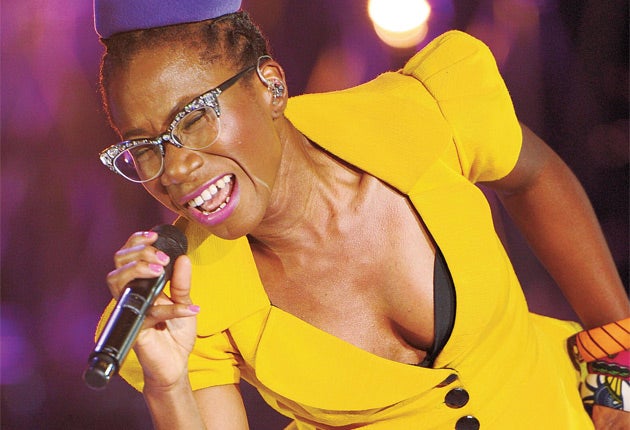Asa - The 'new Sade' just wants to make us laugh
Asa always wanted to sing, but her parents disapproved. Then she met 'dangerous people', she tells Elisa Bray

When Asa was growing up in Lagos, Nigeria, she would sneak away to sing on her own. "I always performed when no one was watching", she recalls. "I had an imaginary audience and I would always perform. I think most of what I'm doing today is from what I was doing in childhood – I was always in my imagination. I play the guitar, a melody comes with pictures, and I start imagining what exactly I want to write about."
Born Bukola Elemide in Paris to Nigerian parents (her stage name, Asa, "hawk" in her native Yoruba, was her nickname), Asa has quietly been building a fanbase. She plays Womad this month, and in October she will perform her biggest UK show to date – at London's Koko.
We are here to discuss the 28-year-old's second album, Beautiful Imperfection, a beguiling collection of uplifting songs that zips along with lilting jazz grooves, and her warm, mellow voice, and was written between Lagos and Paris, the two cities where she divides her time. Its first single, "Be My Man", was A-listed on radio stations nationwide. Not that this is her sole success; since her debut soul-pop album in 2007, she has duetted with Angélique Kidjo and Lenny Kravitz, and has even been hailed as the "new Sade".
Asa grew up listening to Bob Marley, Lauryn Hill, Fela Kuti and Michael Jackson, in the family home, though her own choice of subject matter is less the politics of Kuti and Marley and more life's slighter complications. Home was a block of flats she refers to as "the project", where families were so tightly packed that someone else's fight would become your own. It prompted her song "Oré", sung in Yoruba.
"There were so many people in the neighbourhood and we saw families fight, families destroyed. I remember a lot of teenage pregnancies and my mum warning me not to look at boys.It caused so much commotion, so that song is inspired by what I saw growing up."
With three brothers, there wasn't much time for a childhood, let alone music. "I had to grow up quickly. I was the only girl. As an older girl I had to be responsible, take care of the house especially when my parents were away so that was pretty much childhood."
While Asa says that, even at this young age, she saw herself as a performer and musician, her engineer father and teacher mother had other aspirations for her. Law or medicine were the preferred career-paths for their daughter, so Asa went to university. She soon dropped out to enrol secretly at music school. When her father found out, he promptly cut off her funding.
"It was difficult," she recalls. "I had to go to the music school in secret because I didn't want them to discourage me. They were concerned about me, but I needed to find out myself. I needed to find my path." There were more struggles for the singer. Her first signing was to a record label in Nigeria that attempted to model her as an American pop star, none of which sat comfortably with the singer, who prefers to model herself as quirky and offbeat. When she refused to conform things soon got out of hand.
"I got caught in the wrong set of people and that wasn't a good time.Eventually I got out of the mess, but the damage was already done, because I realised they didn't know anything about the music business and they were dangerous." How dangerous were they?
Enjoy unlimited access to 70 million ad-free songs and podcasts with Amazon Music
Sign up now for a 30-day free trial
Enjoy unlimited access to 70 million ad-free songs and podcasts with Amazon Music
Sign up now for a 30-day free trial
"They were threatening to kill, threatening to do all kind of things. They wanted me to sing in a certain way, they wanted me to do certain things. They wanted me to sing certain songs, like very bad music. I wasn't ready in my songwriting, but there was a rush because they needed to sell – I was their only artist so there was so much pressure." Unsurprisingly, when she eventually escaped the contract, the event left her with a "heavy heart".
"I didn't trust anybody for a very long time and I didn't want to make friends. On the first album I was gloomy, I was sad, I had so much to say. I was angry because I had worked with people who weren't trustworthy. On the second album I needed to change that. I wanted to be happy. I wanted to smile more. I didn't want to be scared anymore, I just wanted to be free."
One of the steps she took to be free was to return to her place of birth, Paris, in 2008. It's where she likes to record music, but it's still Lagos where her heart is, and the source of her inspiration. "I love to write there – I'm so inspired by that world. The city is amazing, it's full of energy, it never stops. I like that."
She spends three months in Paris and the next few in Lagos. "It shouldn't be more than that, otherwise I start to lose it. In Lagos you go crazy sometimes. These two cities work for me." As for her aims in music, it's the simple things that count. "I want to sing and make you laugh and smile," she chirps. "That's it."
Asa plays Womad (www.womad.org) on 29 July
Subscribe to Independent Premium to bookmark this article
Want to bookmark your favourite articles and stories to read or reference later? Start your Independent Premium subscription today.

Join our commenting forum
Join thought-provoking conversations, follow other Independent readers and see their replies